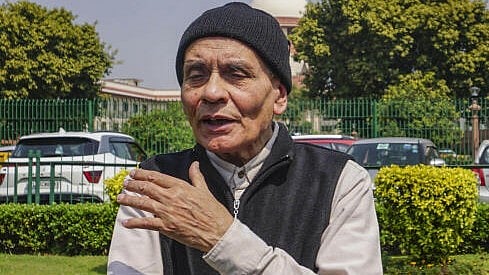
Commodore Lokesh Batra (retd).
Credit: PTI Photo
77-year-old Commodore Lokesh Batra (retd), with shaky hands, tapped out a WhatsApp text to a lawyer from his Noida residence, minutes after the Election Commission of India (ECI) tweeted that it had received the electoral bond data from the state-run State Bank of India (SBI), according to a report by Newslaundry.
The transparency campaigner had been nervous amid the speculation that the SBI might procrastinate the sharing of details on Tuesday.
But soon his phone alerted him to messages informing him of the Election Commission's (EC) tweet - from the Association of Democratic Reforms (ADR), a non-partisan think tank and a petitioner in the electoral bond case, and the Supreme Court lawyer Prashant Bhushan' team.
After a years-long battle fought through the Right to Information Act, 2005, Batra said, "Now, it's official."
According to the publication, the original petition, known as the 'ADR v/s Union of India' case, is based on the documents that Batra had acquired over the last six years.
Delivering its verdict on February 15, the Supreme Court termed electoral bonds - a way of political funding through anonymous donors since 2018 - unconstitutional and also asked the SBI to reveal datasets of bond buyers and parties that encashed them by March 6.
The apex court remained persistent and put the largest bank in India on notice, following which the bank transferred the datasets to the EC on Monday.
'Talk a lot but can't write'
"I talk a lot but I can't write," Batra told Newslaundry.
According to the publication, Batra's wife Jyotsana, a social worker said, "What is it that he wants to talk about? Transparency in governance, reforms, bureaucratic negligence or anything else that concerns the people. But any discussion on a broken water purifier and water pump is summarily dismissed or delayed."
She added, “The family, household chores - comes last for him. But whatever he is doing is for the nation."
'Multan to mission mode'
Batra was born in Multan in an undivided India in 1947. During the partition, the family, like a million others, crossed the Indian border, reported the publication.
He joined the Navy in 1967 before graduating from Meerut University. He had participated in the 1971 India-Pakistan war, and rescued people struck by natural calamities during a super cyclone in Odisha (1999) and an earthquake in Gujarat. Also, built their homes.
He went beyond his official duty to empower women and the differently abled, and undertook literacy initiatives.
He was transferred to Delhi in 1992, where he worked in the South Block. During this time, he maintained an unofficial file called “HRD” which contained ideas how the Navy can lend its helping hand to the poor and disadvantaged.
After retirement, he stayed true to his commitment to work ethics and community service. He would write letters to editors and send photos to them about issues that needed to be highlighted.
‘Disagree that RTI is a weapon’
“In this age, timing and exclusivity is important. I want everyone to have this information. What’s the point of filing RTIs when you are not sharing them?” said Batra, who prefers the tag of 'transparency campaigner' over 'RTI activist'.
He said, “My aim is to bring reforms. Some people say RTI is a weapon. I completely disagree with it. A weapon is used against adversaries or enemies, not against our people. Officials who reply to RTIs are also human beings. There are good people. I use RTI to bring reforms and change. If I file an RTI on an issue, it may wake up officials to it.”
Batra also revealed how he would write the RTI applications. “For each RTI application, I would first give the background of the issue and share documents I have received from previous RTI applications. Only then, I would move to information I need. I would normally seek the whole government file. This may lead to new information,” the publication quoted Batra as saying.
‘Keep me out of politics’
On February 15, the SC called electoral bonds unconstitutional. “After the hearing, he ran upstairs and informed me… All of us were skeptical that the SC would do this. But he was always optimistic,” his wife said.
Excited about the Supreme Court hearing the next day, Batra saw history unfold in the courtroom, which was evident in his use of phrases such as “I was there when Justice Chandrachud said” or “I was there when judges took out a few pages (supplied by ECI from the sealed cover containing electoral bond details till 2019)”.
Batra, through his RTIs, had learnt that the Reserve Bank of India (RBI) and Election Commission were not in favour of the electoral bond scheme, which led to amendments in the Reserve Bank of India Act, Representation of People’s Act, and Income Tax Act.
Over the years, he collected huge data on the scheme, leading to investigative stories. The ADR and Bhushan’s team worked closely with Batra.
“We work as a team. Whenever I receive any new details on electoral bonds, I first share it with them as they are fighting the case in the Supreme Court. They also reciprocate by sharing affidavits and other relevant material with me,” he said.
“Now we have to see the electoral bond data when the ECI publishes it on their website on March 15. We have to see if we can match the donor and donee from the datasets. Then, I have to focus on the PM Cares Fund,” he said.
